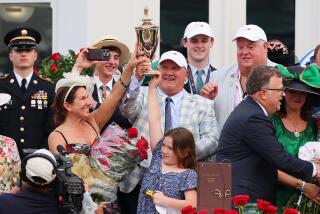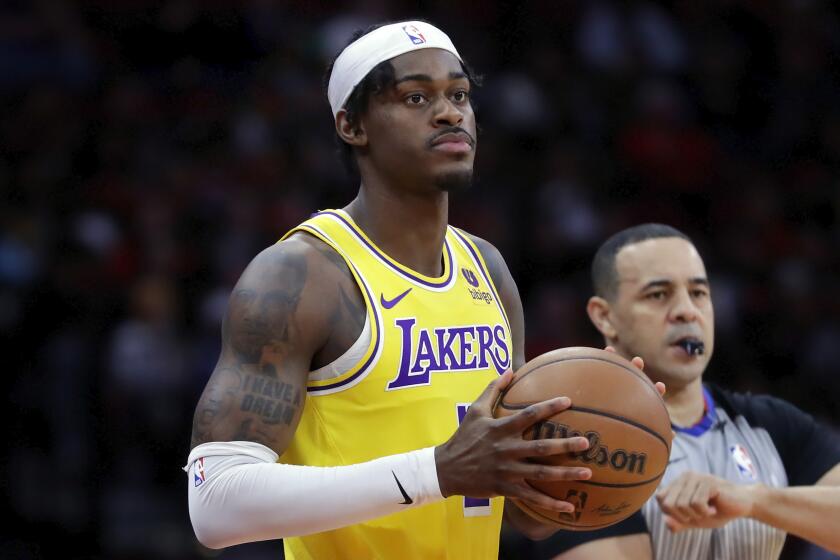Sky Jack Might Pull a Fast One
- Share via
One of the scenarios for today’s 63rd Hollywood Gold Cup is Sky Jack going to an early lead and never giving it up, much the way Marquetry and jockey David Flores won the 1 1/4-mile race in 1991.
Marquetry, who beat favored Farma Way by a head at the wire, paid $56.80, the highest win mutuel in Gold Cup history. The trainer of Marquetry was Bobby Frankel, whose Milwaukee Brew, a late-running 5-year-old, has the task of trying to overhaul the Doug O’Neill-trained Sky Jack and jockey Laffit Pincay.
Frankel, however, sees no similarity between today’s $750,000 Gold Cup and the 1991 edition, which was worth $1 million.
“When Marquetry ran,” Frankel said, “there was other speed in the race, but nobody wanted to go with him. This time, Sky Jack’s about the only speed there is. This race reminds me more of the one I ran in last weekend in New York.”
He was referring to the $500,000 Suburban Handicap at Belmont Park, which was won by E Dubai via a front-end ride from John Velazquez. Frankel’s late-running Lido Palace made up some ground in the stretch but fell three-quarters of a length short of E Dubai at the wire.
Frankel, who won his second Gold Cup last year, when Futural was disqualified for interference in the stretch and the stewards hung up Aptitude’s number, was slightly cheered Thursday when trainer Bruce Headley, at a supplementary cost of $25,000, plus $7,500 in entry and starting fees, dropped Dig For It’s name into the Gold Cup. Dig For It, who is 15-1 on the morning line, is a 7-year-old who has won only six of 43 starts, but five of the wins have come at Hollywood Park.
“Dig For It has a little bit of speed,” Frankel said. “Maybe he’ll run with Sky Jack for a while.”
Dig For It’s last race produced a narrow win in allowance company June 6, when he contested the early pace. But the last time Dig For It ran in a Grade I race, in the Santa Anita Handicap in March, he showed no speed and finished 11th.
Milwaukee Brew, in his second start after his owner, Frank Stronach, moved the horse from his East Coast trainer, Joe Orseno, to Frankel, ended an eight-race, 19-month losing streak by winning the Big ‘Cap. The horse could join some exclusive company by winning the Big ‘Cap and the Gold Cup in the same year. Only four horses have done so. Only five others have won both races in different years.
*
The first horse to win the Santa Anita Handicap and Gold Cup in the same year was Noor, who was elected into the Racing Hall of Fame in April and will be enshrined at Saratoga Springs, N.Y., next month. In 1950, because Hollywood Park was still recovering from a fire the year before, the track ran a split meet, resulting in a nine-month gap between the races.
In late February, carrying 110 pounds to Citation’s 132, Noor and Johnny Longden beat the Calumet Farm nonpareil by 1 1/4 lengths in the Big ‘Cap. In some memorable battles, Noor would beat Citation three more times in 1950, but Citation was finished for the year by the time the Gold Cup rolled around in early December.
Now Noor was packing the kitchen sink--130 pounds--but so was Hill Prince at 130, and the eight-horse field also included another Calumet star, Ponder; Assault, long of tooth but the 1946 Triple Crown champion; and Next Move, the best 3-year-old filly in the country. Around the time of the race, the springer spaniel of Hollywood Park executive Webb Everett had pups, and he named every dog in the litter after a horse in that Gold Cup field.
Longden rode Noor to a one-length win over the longshot Palestinian, with a troubled Hill Prince checking in third. Noor’s camp thought their Irish-bred deserved horse of the year, but when the votes came in, the national honors went to Hill Prince, who had won the Preakness and the Jockey Club Gold Cup and finished second to Middleground in the Kentucky Derby.
Twenty-one years went by before Ack Ack duplicated Noor’s feat in 1971. Ridden by Bill Shoemaker and trained by Charlie Whittingham, Ack Ack was a horse who was impervious to high weights, in love with off tracks. The Big ‘Cap came up muddy as Whittingham smacked his lips. With 130 pounds on his back, Ack Ack went to the front, led by six at the eighth pole and won by 1 1/2 over Cougar II, carrying 125.
Ack Ack, running for Greer Garson and her husband Buddy Fogelson, who had bought him from the Harry Guggenheim estate for $500,000 early in the year, won twice more at 130 pounds, then was assigned 134 for the Gold Cup. The rest of the field ranged between 106 and 117 pounds, but Ack Ack easily disposed of the seven rivals, winning by almost four lengths. A Gold Cup winner has never won under as much weight. Colic almost killed Ack Ack later in the year, and he never ran again. But the voters remembered, selecting him as horse of the year in the first year that the Eclipse awards were installed.
In 1976, after Crystal Water won the Hollywood Derby, Shoemaker urged Connie Ring, the colt’s owner, to run in the Kentucky Derby, but she and trainer Roger Clapp resisted. Crystal Water was better for it as a 4-year-old in 1977. Despite some disappointing races in the Strub series, he went into the Santa Anita Handicap as the third choice, behind King Pellinore and Ancient Title. King Pellinore, shouldering 130 pounds, ran third as Crystal Water, carrying 122 and ridden by Pincay, beat Faliraki by a head. Clapp said later that, just to play it safe, he had blown out his horse an eighth of a mile the morning of the race, with an exercise rider who weighed 145 pounds.
Ancient Title, a 7-year-old, was back for the Gold Cup, but this time Crystal Water was favored and high-weighted at 129 pounds, four more than his rival. Only a neck and a nose separated the first three finishers, with Cascapedia second and Caucasus third. Ancient Title was fourth.
After Affirmed’s Triple Crown year, the winter of 1979 brought him and trainer Laz Barrera back to California, where he had prepped for the Kentucky Derby. Despite winning the Strub by 10 lengths, Affirmed faced seven hearty opponents in the Big ‘Cap. Carrying 128 pounds and ridden by Pincay, who had replaced the slumping Steve Cauthen for the Strub, Affirmed beat Tiller by 4 1/2 lengths. Almost four months later, in the Gold Cup, he carried 132, spotting Sirlad 12 pounds, and beat him by three-quarters of a length. Affirmed earned $275,000--$88,100 more than he got for winning the Derby--and the Daily Racing Form’s chart footnotes said it all:
“[He] almost drew clear, then relaxed slightly in the closing yards when it appeared he knew he had it won.”
More to Read
Go beyond the scoreboard
Get the latest on L.A.'s teams in the daily Sports Report newsletter.
You may occasionally receive promotional content from the Los Angeles Times.










